Rodent Pest Control Services Brisbane
Are you concerned about the multiplying community of rats or mice around your property and the disturbance they’re causing? Are you concerned that the health of your family or coworkers may be endangered due to the presence of rodents?
Rats and mice aren’t just nuisances; they also pose several health risks, such as Murine Typhus fever, Lyme disease, and more. If you’re concerned about a rodent infestation in your home or workplace, contact Blue Chip Termite & Pest Control for rodent pest control services.
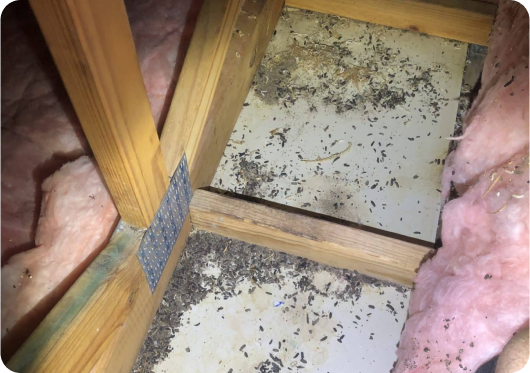
Signs of a Rodent
Infestation
DROPPINGS
One of the most common signs that you have a mouse or rat infestation is if you find droppings in and around your home/workplace. Rodent droppings are small and pellet-like and are typically found along the pathways they use to roam your property, near food or in secluded areas.
GRAW MARKS
Rats and mice constantly need to gnaw on things to prevent their teeth from overgrowing. Finding gnaw marks on wooden items, electrical wires, or food packaging is a sure sign that you need a rodent exterminator.
STRANGE NOISES
Rodents are nocturnal animals, so it’s more likely that you’ll hear them at night. If you hear scratching, squeaking or scurrying from ceilings, walls or floorboards, it’s time to call Blue Chip Termite & Pest Control for help.
NESTS AND BURROWS
Rodents build nests using shredded materials like paper, fabric, and insulation. The most common place to find rodent nests and burrows is in dark, secluded places such as the attic or storage room. You may also find rodent nests outdoors under shrubs or in garden areas.
CALL US TODAY OR get a quote for all your pest control needs
Blue Chip’s Rodent Pest Control Service
When you contact us for our rodent pest control services, one of our technicians will visit your property to conduct a site assessment. We will locate possible entry points and determine the best course of action.
After our initial assessment is complete, we’ll design a tailor-made rodent removal plan to tackle your specific situation. We’ll discuss with you the type of rodents you have, the control program we’ll put in place, how long you can expect it to take and what kind of outcome you should expect. We will not begin any treatment procedure before we are certain that you understand our plan of action.
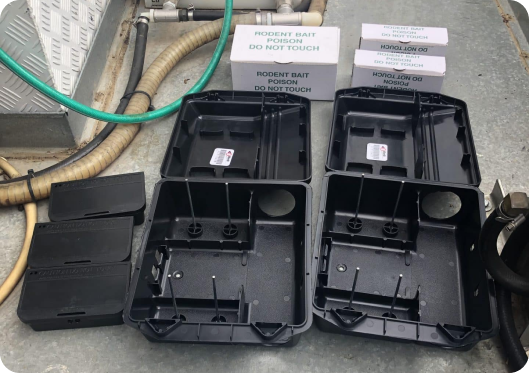
PET-FRIENDLY RODENT INFESTATION TREATMENT PROCESS
Our trucks carry two different types of rodent baits. The first is a blood poisoning bait, which can cause secondary poisoning if your pet consumes an affected mouse or rat. The second is a pet-friendly bait. It infects the rodents with an overload of calcium, which cannot be transferred as a secondary kill. Therefore, if your pets consume a rodent that has eaten some of this bait, the chance of hurting them is greatly reduced.
RESIDENTIAL RODENT INFESTATION TREATMENT PROCESS
We’ll install rodent bait boxes in the roof void of your property and two commercial-grade large rodent boxes around the outer perimeter of your property or under the house. Baiting in the roof void alone is not an effective way of controlling the problem, as rodents generally enter the house from an external entry point. Using outdoor baits in conjunction with boxes in the roof void allows us to better control the problem.
Rats have a 50-metre forage radius, so they don’t usually go past your property or your neighbour’s property. They also generally use the same travel paths. On the other hand, mice only have a 10-metre forage radius, so when you see them, they’ll not be too far from where they are living. Due to this, most of our customers’ rodent problems drastically reduce only a few weeks after baiting.
You also won’t need to worry about rodents dying on your property because, in 95% of cases, they flee the premises in search of water before they die.
INDUSTRIAL AND COMMERCIAL RODENT INFESTATION TREATMENT PROCESS
With all of our large-scale customers, such as warehouses, restaurants, schools, etc, we provide an integrated management plan for all rodent problems and needs. This starts with a free onsite assessment, giving you a detailed quote outlining what we think we should do and why, as well as organised on-time scheduled services.
We are proud to say we have been the sole pest control company servicing Guide Dogs Queensland’s head office in Brisbane for over five years where we currently have around 25 large rodent stations around their facility. As you can understand, this environment is an extremely delicate area due to all of the guide dogs being trained and housed there.
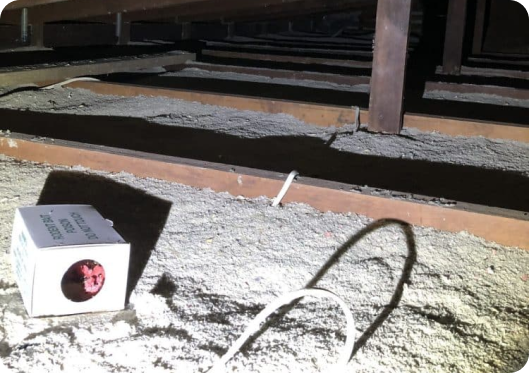
With our trucks carrying generic rodent bait and a pet-friendly brand, we can provide safe and effective pest control in a diverse range of environments.
Because rodents seek water once they have been baited, they will typically die elsewhere and away from your property. You can have peace of mind knowing your property is free from living and dead rodents once we have completed our rodent infestation treatment process.
Rodent Pest Control areas
Let our family help solve your family’s pest control problems.
Why Rodents Cause Problems
Rats and mice aren’t just a nuisance on your property; they also cause a number of problems.
Reason 1
Their droppings are contaminated with disease, and if rodents chew on electrical wiring, it can result in a fire.
Reason 2
Fleas that live on rats may bite humans and transmit a dangerous bacterium that leads to an illness called Murine Typhus fever.
Reason 3
Getting a bite from an infected mouse or rat can make you sick, and the ticks that live on mice can cause you to contract Lyme disease if you are bitten.
HOW TO PREVENT A RODENT INFESTATION
SEAL ENTRY POINTS
Inspect your home for cracks, holes, or gaps in the foundation, walls, and around doors and windows. Seal these openings with steel wool or metal flashing to prevent rodents from entering.
STORE FOOD PROPERLY
Keep food in airtight containers made of glass or metal. Ensure that food is not left out and that crumbs and spills are cleaned up properly. This also includes pet food, which shouldn’t be left out overnight.
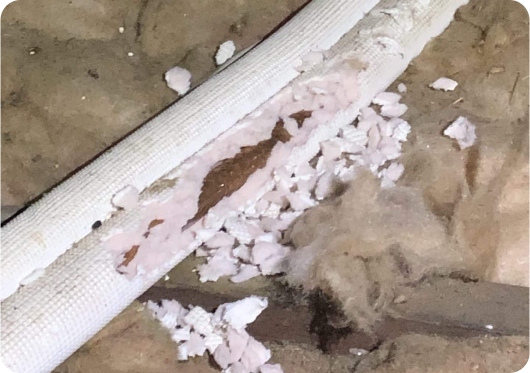
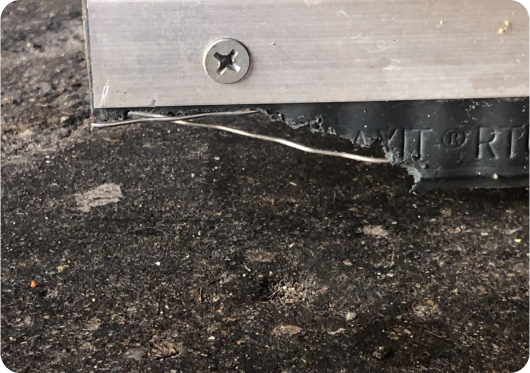
MANAGE RUBBISH AND COMPOST
Use rubbish bins with tight-fitting lids and regularly dispose of rubbish. If you compost, use a rodent-proof compost bin and avoid adding meat, dairy or oily foods.
FIX LEAKS
Eliminate water sources by repairing leaky taps, pipes and clogged drains. Rodents need water to survive, so removing their water source can help deter them.
REGULAR INSPECTION
Periodically inspect your home and property for signs of rodent activity, such as droppings, gnaw marks and burrows. Early detection is key to preventing a full-blown infestation.
CONTACT BLUE CHIP TERMITE
& PEST CONTROL FOR
EFFECTIVE RODENT REMOVAL
At Blue Chip Termite & Pest Control, we’ve been keeping properties rodent-free for years. Our state-of-the-art methods and treatments ensure that rodents are deterred from your property and die elsewhere. If you think you have a rodent infestation and want to solve the problem, contact Blue Chip Termite & Pest Control for an initial assessment.
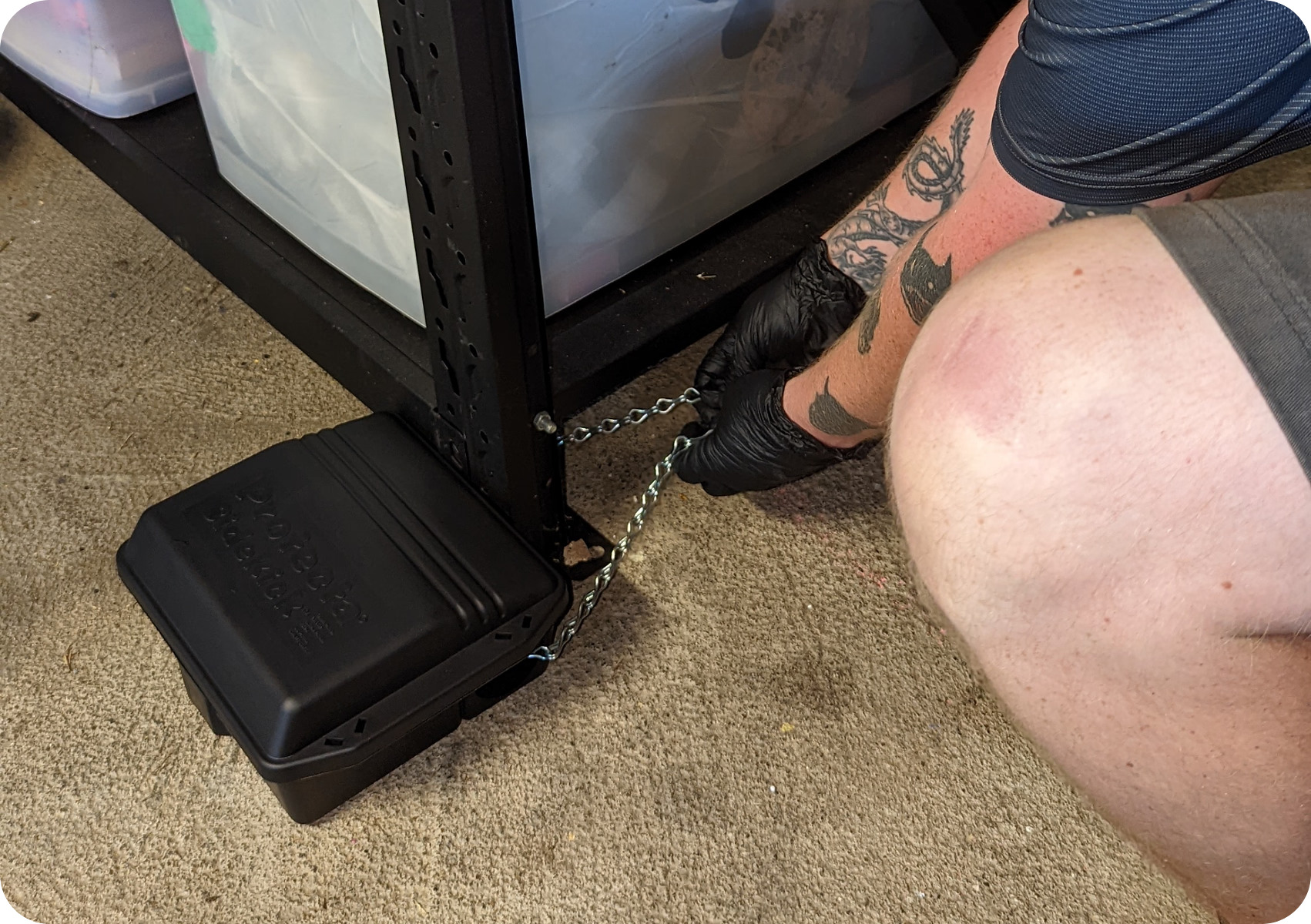
You don’t have to share your life with these pests. Contact Blue Chip Termite & Pest Control today to regain control of your home.
-
What types of rats and mice are common in Australia?
There are three common types of pest rodents in Australia: the roof rat, Norway rat, and house mouse.
Roof rats, also known as ship rats or black rats, have a smallish body and a tail as long as the head and body combined.
Norway rats, alternatively known as wharf rats, brown rats, and sewer rats, are characterised by a plump body and a size larger than the typical roof rats. The tail is scaly, semi-naked, and shorter than the body and head, while the fur is brownish and coarse. Norway rats also leave behind burrows.
As for the house mice, you may already know that they are comparatively small and have a pointed snout, oversized ears, and protruding eyes.
Mice can breed up to 10 times a year and are only pregnant for 3 weeks. Meanwhile, rats can breed up to 6 times a year and can have up to 12 babies per litter.
Details Norway Rats Roof Rats House Mouse Weight 450g 200g 20g Sexual maturity 3 – 4 months 3 – 4 months 6 weeks Litters per year Up to 6 Up to 5 Up to 10 Pups per litter Up to 10 Up to 8 Up to 6 Daily travel Up to 50 meters Up to 50 meters Up to 10 meters -
How do rodents get in my house?
- Rodents can fit into areas the size of their skull.
- Through weep holes in the house walls.
- Under wall cavities on raised houses.
- By climbing bushes and trees that come in contact with the house walls.
- Power lines.
-
Does having chickens and/or pet birds impact rodent pest control?
- This will increase rodent activity and will require an ongoing baiting schedule to keep the rodents under control.
-
How long before I see results?
- Rodents enter the house at different times, so generally, you’ll stop noticing noises in the roof or walls within a few weeks—sometimes as little as a few days.
- Quality
- Integrity
- Results
Areas We Service
As a family-owned and operated business based in Brisbane’s Northside, our service areas include
- Brisbane through to Caboolture
- Redcliffe to Samford
- West End to Springwood

